Viktor Yanukovych Bio Box
Viktor Yanukovych- Born 1950 in Yenakiyeve, Donetsk region
- Jailed twice for violent crimes
- Worked as transport executive in coal-mining industry
- Became governor of Donetsk in 1997
- Named prime minister in 2002
- Won disputed 2004 presidential elections, ousted in Orange Revolution
- Appointed prime minister again in 2006
- Elected president in 2010
- Parliament voted to remove him from power Feb. 22, 2014
Acting interior minister Arsen Avakov announced the warrant in a Facebook statement Monday. He said Yanukovych was last seen in the pro-Russian Crimea region of Ukraine, but the ousted leader's exact whereabouts are not clear.
European Union foreign policy chief Catherine Ashton traveled Monday to Kyiv, where she met with Ukraine parliament speaker Oleksandr Turchynov, who was made the country's acting president Sunday. Ashton also met with political party leaders, including Vitali Klitschko and Arseniy Yatsenyuk.
Ashton's office said her trip to Kyiv would include discussing ways the EU can help the political and economic stabilization of Ukraine.
White House spokesman Jay Carney said Monday the United States is ready to provide financial support to Ukraine, to complement aid from the International Monetary Fund and help the country invest more in health and education.
US official heading to Kyiv
U.S. Deputy Secretary of State William Burns will travel to Ukraine on Tuesday. According to the State Department, he will meet with Oleksandr Turchynov, who was speaker of Ukraine's parliament before being made the country's acting president Sunday, as well as opposition leader Arseniy Yatsenyuk and other members of parliament.
Burns "will urge the new government to take all steps necessary for free and fair presidential elections in May," the State Department said.
Olexander Turchynov Bio Box
Olexander Turchynov- Named interim president after ouster of Viktor Yanukovych
- Served as Yulia Tymoshenko's deputy prime minister from 2007-2010
- Deputy leader of Tymoshenko's Fatherland Party
- Unsuccessfully ran for mayor of Kyiv in 2008
- First elected to parliament in 1998
- A pastor at Kyiv's Baptist Church
- Has written several novels
"Our priority is returning to the path of European integration where the fight for Maidan began. We have to return to a family of European countries and to understand the importance of relations with the Russian Federation and be ready to build relations on new and fair partnership of good neighborly relations," said Turchynov.
He has promised a new government by Tuesday, and lawmakers have called for new presidential elections on May 25.
Also Monday, the acting finance minister Yuri Kolobov said Ukraine will need $35 billion in foreign aid to cover its bills during the next two years. He called for an international donor conference and appealed for urgent aid, saying some of the money needs to come within two weeks.
Russian ire
Russian Prime Minister Dmitry Medvedev on Monday questioned the legitimacy of Ukraine's new authorities, saying they had come to power in what "in its essence is the result of an armed mutiny."
Russia's Foreign Ministry charged that "dictatorial and sometimes terrorist methods" are being used in various regions of Ukraine to pressure those who disagree with the change in government.
Key dates about Ukraine's events
Key dates about Ukraine's events2013
- Nov. 21: Ukraine suspends plans to sign EU association agreement
- Nov. 30: Riot police crack down on anti-government protesters in Kyiv
- Dec. 17: Russia offers $15 billion in loans and slashes gas prices
2014
- Jan. 16: Ukraine parliament passes anti-protest law
- Jan. 22: Protests spread, two protesters shot and killed in Kyiv clashes
- Jan. 29: Parliament approves law offering amnesty to detained protesters if demonstrators abandon occupied buildings
- Feb. 16: Protesters leave occupied government buildings after 2 months
- Feb. 18: Police storm Kyiv protest camp, 18 protesters and police are killed
- Feb. 20: Battles erupt, despite a truce announced a day earlier. At least 39 people are killed
- Feb. 21: President Yanukovych announces early elections after talks brokered by EU diplomats
- Feb. 22: Opposition leader Yulia Tymoshenko is freed
- Feb. 23: Oleksandr Turchynov named interim leader, the whereabouts of Viktor Yanukovych are unclear
- Feb. 24: Ukraine issues arrest warrant for ousted President Yanukovych
Medvedev said Monday that the ambassador was recalled because "there is a threat to our interests, to the lives and health of our people" in Ukraine.
The United States and Britain have warned Russia not to send forces into Ukraine. U.S. National Security Adviser Susan Rice said a Russian military intervention would be a "grave mistake." Britian’s Foreign Secretary William Hague has issued a similar warning to Russia.
Hague will travel to Washington later on Monday to discuss Ukraine with U.S. Secretary of State John Kerry and officials from International Monetary Fund.
Specter of a split
Ukraine’s crisis has brought to the forefront tensions between its traditionally more pro-Russian East and the country’s generally pro-European West. But observers are downplaying speculations that the rivalry may cause Ukraine to break up.
Jonathan Adelman, a Russian expert at the University of Denver's Korbel School of International Studies, told VOA that although some might jum to the conclusion that a split would be logical, in reality it's highly unlikely.
"Those in eastern Ukraine are convinced that with the backing of Russia they can hold their position and dominate the whole country, which they did under Yanukovych. The people in west Ukraine, of course, were looking at the 2004 Orange Revolution because they were heavily influenced by the Poles and Lithuanians and by more western Europeans, and they're convinced that with Western help they can dominate it. So I think the probability of a split is very small; even though it would be very logical, very few people seem to want it," said Adelman.
Some information for this report provided by Reuters






